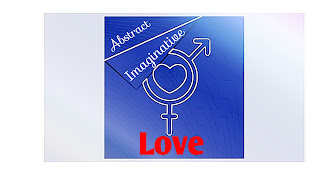It's a thing of imagination to love. A smiling face of petals of flower upon the rain. In my neighborhood, there's an imaginative eyecatcher who steals my eyes and my soul for the taste of a smiling charmer.
Imagining the abstract attracts energy. The energy of love. The thing we can feel, but is difficult to express it. In imagination, a beautiful flower that exists in expectations gives a reason to dream even more.
We love unknowingly. We do not plan to love. We fall in love again and again before waking up. To wake up from the fantasy of love is moving a needle of time to conscious inclination.
Do we love because we have reasons to love? Do we care enough about our feelings when in love? Love is an emotional content of feelings that's hard to resist. Love is intuitive and natural, we do know until when it snatches all our dreams with it.
Who we are, makes us love. It's innermost power, an important aspect of love that doesn't command to love, but why we love. Real love is from the heart, while imagined love takes up imagination as the work of the brain.
Thinking of what is of value out of love is an imaginative sense of love with significant meaning in life.
- Marriage.
Imaginatively and creatively love gets attached to a married couple. And therefore having a sense of responsibility to both family and couples to thrive.
Out of curiosity, sex is linked with short-term thinking. Love is linked with long-term thinking, and creativity as a holistic approach to love makes relationships work. Love is enhanced by self-reflection in the eyes of the soulmate.
- Family.
Thinking that most people get married to raise and build a family. An abstract love makes a family. Through family love multiplies. Love has the power to affect and shape future life.
- Children.
Imagine children when you think of pure love. Love imagination in getting children who can carry legacies into the genuine world of experiences and expectations.
- Care.
Care is a strong glue to strengthen a bond of love. It's a regular cohesive force. Also, care is like watering a flower for its genuine petal beauty display.
- Peace.
Love begets a tranquil lifestyle and true reflections of imagination. People who love each other do affect each other and influence others with love and fantasies.
- Future.
Love makes the imagination of the future a reality. Together with our loved ones, we dream of a better future out of love. Love attracts long-term views of life and creativity.
Research shows that increased levels of positive illusion between spouses have been attributed to a decreased chance of relationship problems, greater satisfaction, and less fighting or suspicion in relationships. Long-term investment and proper nurturing of children are also related to positive illusions between spouses.
- Stability.
Love is strength. It's to walk in the path of power to love unconditionally. To love is to believe and hope. Love triggers stable thoughts towards abstract images of life with affection.
- Animal Nature.
Love is a way of humans. It's an animal quality of experiencing emotional content, expressing it, and using it to affect others with it. Love is an involuntary contagious manifestation of zeal. A reality to imagine of abstract love.
- Happiness.
Fantasy in love is happiness. Dreaming of a smiling flower respond with a smile. Taking the flower with you everywhere is an imagining of ecstasy.
- Sympathy
Through imagination we can put ourselves in the shoes of our spouses. We can recognize what the other person feels through love and imagination.
Imagining of the value of a speaking smile in those visions. The lights of the stars in the streets miss the scent of a smiling flower. A warmer day that's what can do better with the finest.
Love as an emotionally complex view has the quality of having an emotional experience of view upon another person. It's a temperament of love with emotional feelings.
A different way to fulfill love is having an imagination. Imagining love as happiness, peace, faith, understanding, and success.




Thank you for reading!